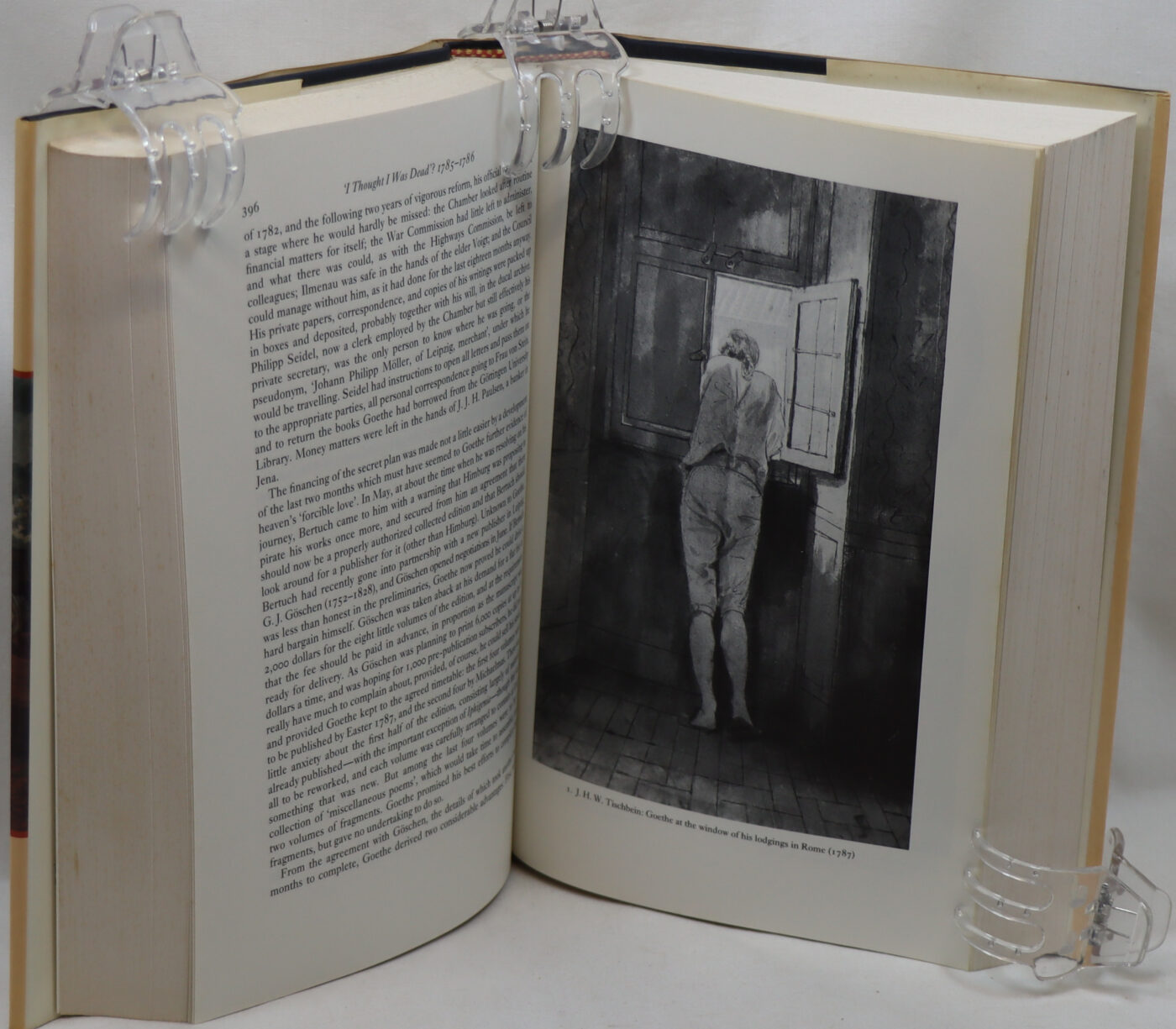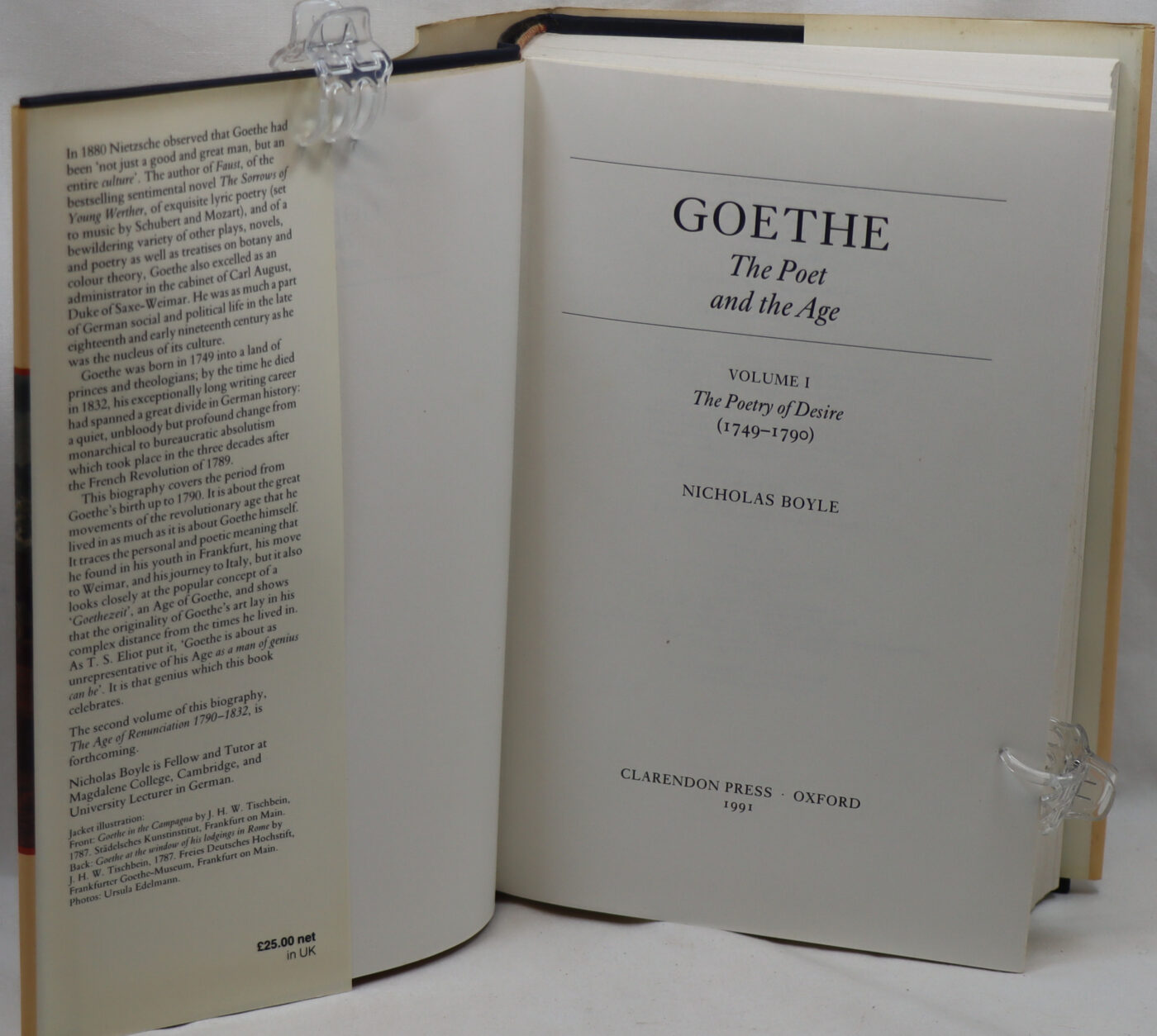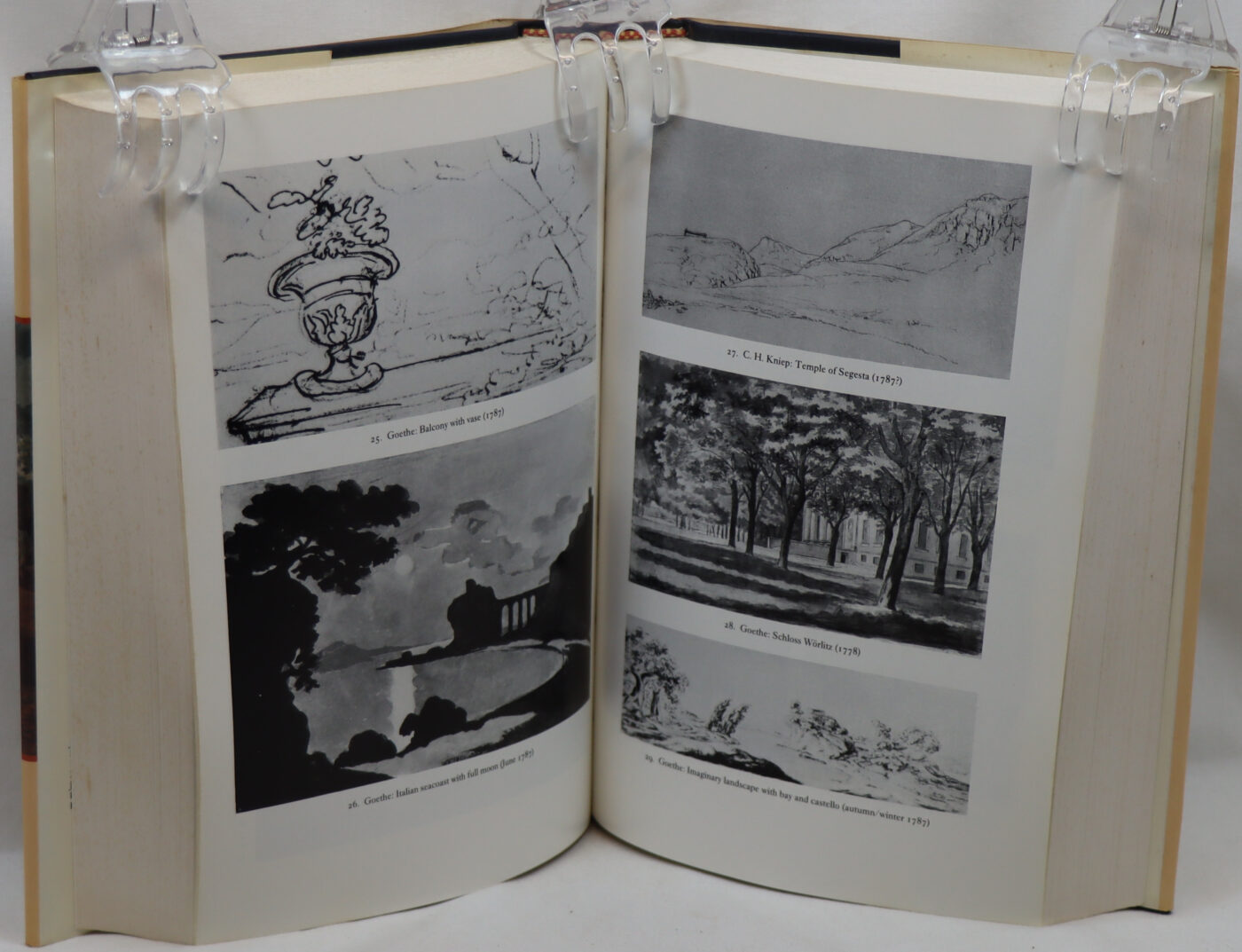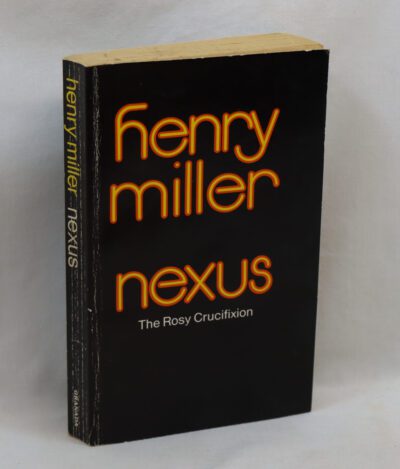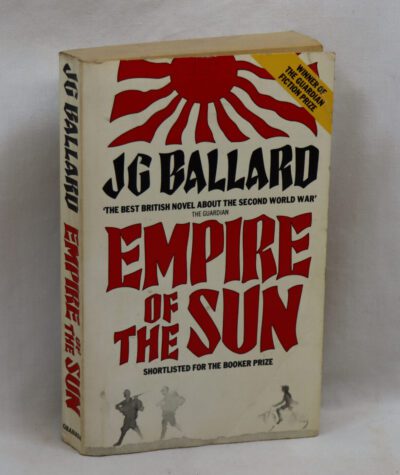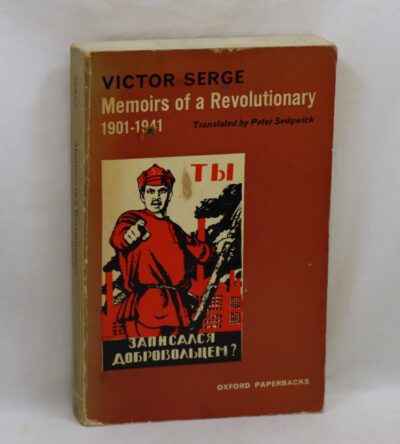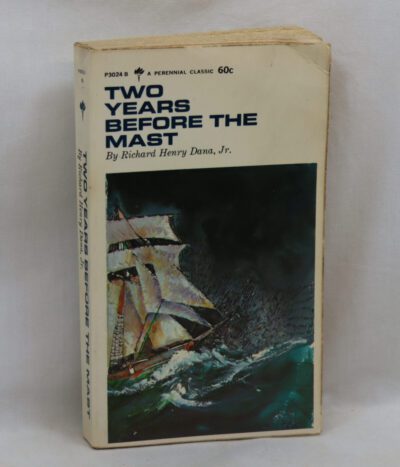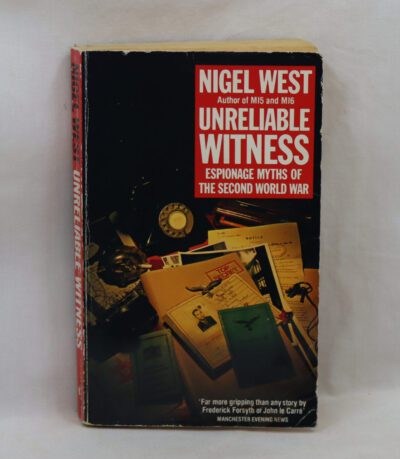Goethe. The Poet and the Age.
By Nicholas Boyle
ISBN: 9780192829818
Printed: 1991
Publisher: Claredon Press. Oxford
| Dimensions | 17 × 24 × 5 cm |
|---|---|
| Language |
Language: English
Size (cminches): 17 x 24 x 5
Condition: Very good (See explanation of ratings)
Your items
Item information
Description
In the original dust jacket. Black board binding with gilt title on the spine.
We provide an in-depth photographic presentation of this item to stimulate your feeling and touch. More traditional book descriptions are immediately available
-
Note: This book carries a £5.00 discount to those that subscribe to the F.B.A. mailing list
A truly quality book, please view the photographs.
In 1880 Nietzsche observed that Goethe had been “not just a good and great man, but an entire culture.” The author of Faust, of exquisite lyric poetry, and of a bewildering variety of other plays, novels, and poetry as well as treatises on botany and color theory, Goethe also excelled as an administrator in the cabinet of Carl August, Duke of Saxe-Weimar. Now, Nicholas Boyle has written the definitive biography of this extraordinary figure–indeed, The Poet and the Age is the first full-length, original English-language biography of Goethe in sixty years.
In this elegant and enjoyable first volume–the first of two projected books–Boyle captures the passions and poetry of the young Goethe, leading us up to the moment when the French Revolution shook the foundations of all of Europe. Boyle contends that, although Goethe was certainly as much a part of German social and political life as he was its cultural nucleus, there was no single “Age of Goethe.” Instead, Goethe’s life spanned a great divide in European history: half was spent under a monarchy, and half under a middle-class bureaucracy. The first forty years of Goethe’s creative life, rendered by Boyle in captivating detail, saw the early conception of Faust, and Goethe’s rise to literary fame on the heels of his bestselling sentimental novel The Sorrows of Young Werther, a book which captured the European imagination like no other before it. Werther became a fashion in a strikingly contemporary sense: impassioned readers imitated the clothing, the sentiments, and even the tragic suicide of the novel’s young hero. Napoleon claimed to have read Goethe’s book seven times, and years later Mary Shelley cited it as the first book read by the monster she created in Frankenstein. Boyle provides not only close and provocative readings of Goethe’s literary works, but also a vivid portrayal of a convulsive age of revolution, including insights into Weimar court life, and accounts of other master thinkers like Lessing and Schiller.
Part social history, part literary criticism, this is biography on a grand scale–as sweeping and magnificent as the life it portrays. Boyle’s work is accessible to anyone, and does not assume a prior knowledge of German history or literature, but it is also rigorous and original–a major work of scholarship. Volume II, The Age of Renunciation, is in preparation.
Reviews
-
`THE first volume of Nicholas Boyle’s Goethe: The Poet and the Age promises well for the second and the complete work will doubtless rank among the few important English books on Goethe to appear since 1949,…This is an enjoyable , erudite book for which the scholars and students whom he addresses will be grateful. It contains a full index and notes and thirty-seven well-chosen illustrations. Translations are given of all German passages cited. We look forward to volume II.’ K.G. Knight, Notes and Queries`Vivid, lucid and pleasurable…reads like a fine novel, yet is also quietly encyclopedic.’ Times Higher Educational Supplement`biography at its best’ Doris Lessing, Independent`The enthralling and meticulous first volume of Nicholas Boyle’s Goethe: The Poet and the Age (Oxford #25) makes up for decades of British indifference.’ Michael Ratcliffe, Observer`a biography of profound scholarship and classically elegant prose, measured yet never booming or boring’ Rupert Christansen, Observer`Index and notes are of an impeccable care and learning.’ Hardy Amies, Daily Telegraph’This landmark work takes us exactly half way through Goethe’s life. The completion of Boyle’s mighty synthesis is eagerly awaited.’ Taxon 41 (May 1991)’magisterial life of Goethe’ John Batchelor, British Book News, September 1993’The first question that can reasonably be put about a work of these dimensions … is whether its length is justified by the scope of its subject and its usefulness to students and scholars. That this is undoubtedly so is … a tribute to the meticulous and scholarly way in which Boyle has gathered and arranged his material … in this volume Boyle has not only laid a sound foundation for the understanding of Goethe’s prodigious output in the second half of his life; he has provided an immensely informative overview of the intellectual and cultural context of Goethe’s early career and a readable and authoritative account of his personal and literary development up to and including the Italian Journey.’ Forum for Modern Language Studies, Volume XXIX No. 3, July 1993’This is the first volume of what will surely be the most comprehensive and authorititative biography of Goethe in English. Boyle’s record of the first forty years of Goethe’s life is minutely detailed, but also establishes a firmly structured profile of his work and his creative personality in a dense but lucid account of the poet’s personal and public relations. Boyle’s sober account of the life and works is not without moments of humour, even hilarity. Boyle also provides an exhaustive account in breadth and depth of the Age in which and, more often than not, against which Goethe’s genius asserted itself.’ John R. Williams, University of St. Andrews, New German Studies, Volume 17, Number 2, 1992/93’physically monumental … In its scope and command of detail, too, and in the sustained intelligence of its writing, it is a masterpiece of monumental proportions. This biographer is sensitively alert to the convergence of one man’s history and that of his class, … his country, and Europe at large … excellent volume.’ Rosemary Ashton, University College, London, Review of English Studies, Vol. 45, No. 177, Feb 1994`The various works are examined in great detail so that the reader has here a history of German literature as well as a study of Goethe in his middle period.’ (E.B), Contemporary Review, Nov. 2000.
-
This is the first of three volumes (the third is still being written); it should go without saying that it is a scholarly biography, but based on some reviews, apparently it does need to be said. At some level, it is a reference book, but one can also enjoy it by reading selected sections. I am not a literature scholar by any means, and at first, this book intimidated me. The first chapter was excellent, but then I got bogged down in the next chapter due to deep discussion of literary theory and religious arguments. But I slogged on, and then was mesmerized by the half dozen pages describing the relationship between Goethe and Charlotte von Stein. Now I realize that one can enjoy this book by reading quickly those portions that are not so interesting and then read leisurely those portions that excite you. This 3-volume biography is clearly not for those who only enjoy drive-through fast-food restaurants, but for those who enjoy long drawn out multi-course banquets. One last thought: there are so many good things to say about this book, that to list any one thing is inadequate, but the fact that Nicholas Boyle includes the translation to every entry in German is wonderful. For those who say the book doesn’t give a good picture of what Goethe was really like, or what his home life was like, after reading the section concerning 1775 – 1786, I come away feeling I know Goethe pretty well: his expertise in government made me think of Kissinger; his poetry, of course, rivals Shakespeare; his passion for women makes me think of any number of Romantics; and, his interest in science makes me think of Darwin. Maybe by the time I finish all three volumes I will realize I am completely wrong, but it’s a good starting point.
Nicholas Boyle is University Lecturer in German and Fellow of Magdalene College, Cambridge. A Goethe specialist, Boyle has written extensively on German and French literature and philosophy.
Johann Wolfgang von Goethe (28 August 1749 – 22 March 1832) was a German polymath who is widely regarded as the most influential writer in the German language. His work has had a wide-ranging influence on literary, political, and philosophical thought in the Western world from the late 18th century to the present. A poet, playwright, novelist, scientist, statesman, theatre-director, and critic, Goethe wrote a wide range of works, including plays, poetry and aesthetic criticism, as well as treatises on botany, anatomy, and colour.
Goethe took up residence in Weimar in 1775 following the success of his first novel, The Sorrows of Young Werther (1774), and joined a thriving intellectual and cultural environment under the patronage of Duchess Anna Amalia that formed the basis of Weimar Classicism. He was ennobled by Karl August, Duke of Saxe-Weimar, in 1782. Goethe was an early participant in the Sturm und Drang literary movement. During his first ten years in Weimar, Goethe became a member of the Duke’s privy council (1776–1785), sat on the war and highway commissions, oversaw the reopening of silver mines in nearby Ilmenau, and implemented a series of administrative reforms at the University of Jena. He also contributed to the planning of Weimar’s botanical park and the rebuilding of its Ducal Palace.
Goethe’s first major scientific work, the Metamorphosis of Plants, was published after he returned from a 1788 tour of Italy. In 1791 he was made managing director of the theatre at Weimar, and in 1794 he began a friendship with the dramatist, historian, and philosopher Friedrich Schiller, whose plays he premiered until Schiller’s death in 1805. During this period Goethe published his second novel, Wilhelm Meister’s Apprenticeship; the verse epic Hermann and Dorothea, and, in 1808, the first part of his most celebrated drama, Faust. His conversations and various shared undertakings throughout the 1790s with Schiller, Johann Gottlieb Fichte, Johann Gottfried Herder, Alexander von Humboldt, Wilhelm von Humboldt, and August and Friedrich Schlegel have come to be collectively termed Weimar Classicism.
The German philosopher Arthur Schopenhauer named Wilhelm Meister’s Apprenticeship one of the four greatest novels ever written, while the American philosopher and essayist Ralph Waldo Emerson selected Goethe as one of six “representative men” in his work of the same name (along with Plato, Emanuel Swedenborg, Michel de Montaigne, Napoleon, and William Shakespeare). Goethe’s comments and observations form the basis of several biographical works, notably Johann Peter Eckermann’s Conversations with Goethe (1836). His poems were set to music by many composers, including Wolfgang Amadeus Mozart, Ludwig van Beethoven, Franz Schubert, Hector Berlioz, Franz Liszt, Richard Wagner, and Gustav Mahler.
Want to know more about this item?
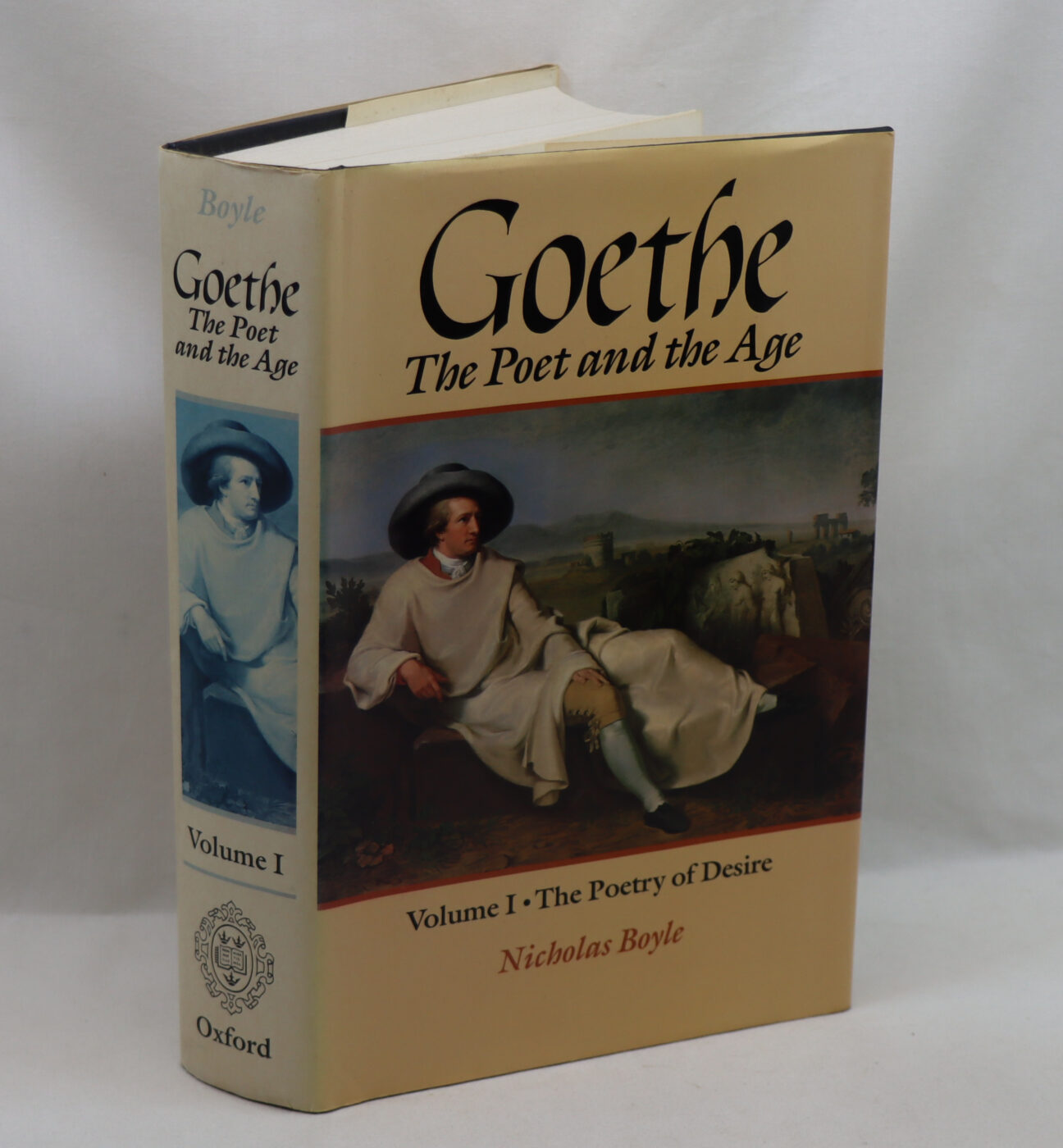
Share this Page with a friend

